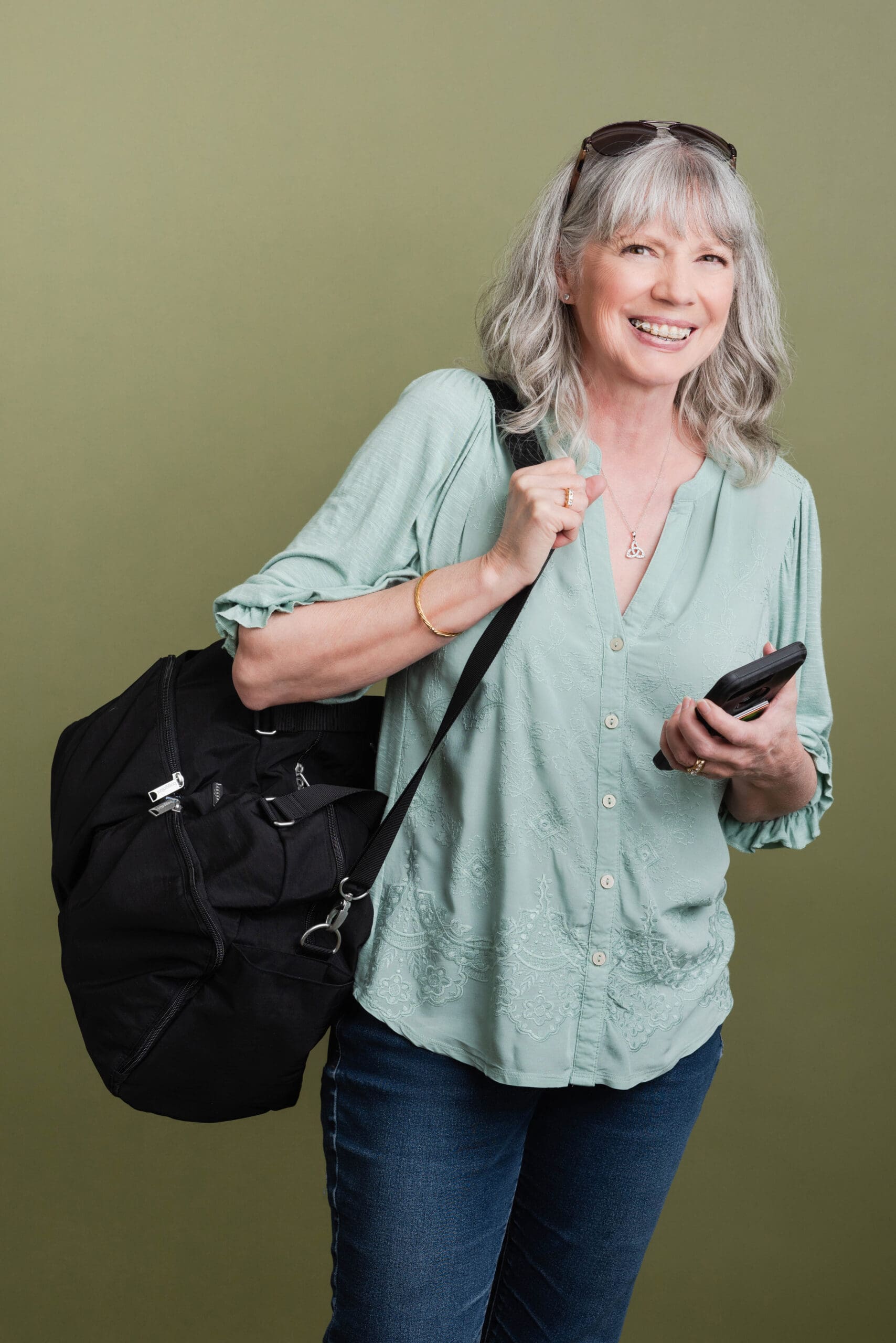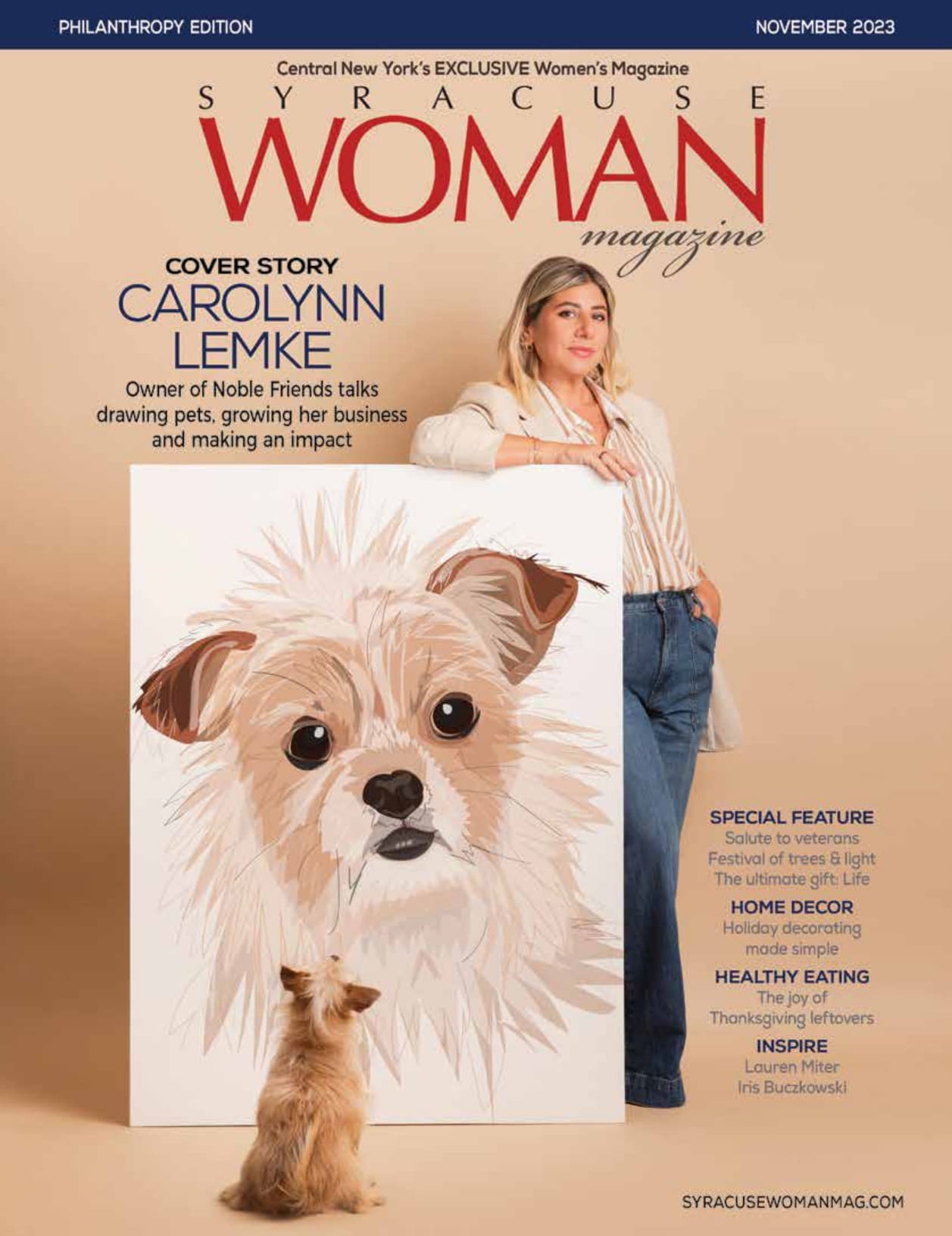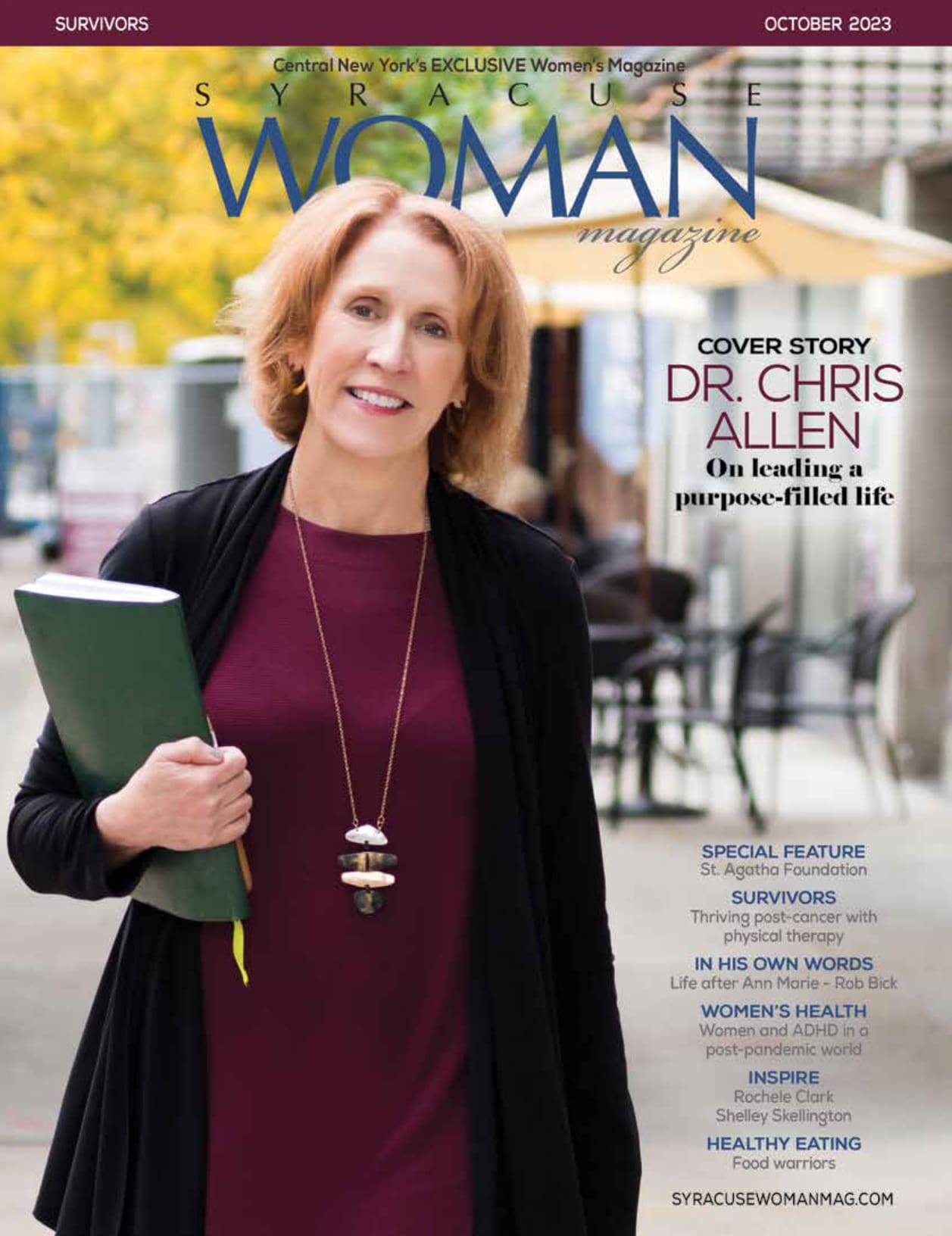Art has always been a haven for Sandra Fioramonti-Sabene.
“Art has been a way for me to check in with myself, to express just whatever I really can’t put words to,” she said. “It’s always been that healing tool for me to be really connected with how I’m feeling, and the path that I’m on.”
Sandra operates Artistic Innovations, LLC, believes that art should provide a safe space, a sense of belonging and, most importantly, an outlet for emotional expression. In all of her classes, from simple drawing and painting to her popular meditative painting retreats, she encourages her students to relax, breathe, not to worry about the aesthetics of the piece — and to feel.
She explained her philosophy in a TED Talk she gave last summer at Onondaga Community College.
“Let go of the outcome, let go of trying to make something, or wondering what it would look like, or where you’re going to end up putting this product,” she said in the talk. “The magic, the art is truly in the letting go.”
The art of expression
That’s the kind of art Sandra teaches at her studio on Lake Drive in the village of Liverpool: what she calls the expressive arts. She seeks to make her studio, the Liverpool Art Center, a haven for all who enter.
“It’s not about creating something that you want to take home and put on the fridge,” she said. “It’s about that moment where you had a deeper sense of self-awareness, or a moment of growth, or gratitude, or anything that has the shift inside of you.”
That’s not to say you can’t learn the basics of, say, drawing and painting from Sandra. She also teaches what she calls the academic arts.
“There is art the way most people think of art, creating art,” Sandra said. “And I hear all the time, ‘I can’t even draw a stick figure.’ And so it’s those have-tos and shoulds. It’s that notion that we have to be good at something before we learn how to do it. Or there’s a whole process that we have to do it a certain way.”
Sandra does offer more traditional painting and drawing classes and has since she started her business.
“The ongoing, year-round classes for adults and teens offer support and hands-on instruction that allow the students to set the pace, choose the medium and discover their own unique style,” she said. “The challenges of learning something new and push the edge of our comfort zone in the art studio inspires students to connect and dig deep.”
But Sandra’s passion is in the expressive arts.
“What I teach in the art of letting go is you have to have this space that feels safe to you, to be able to express in that way,” she said.
It’s that kind of art — journaling, painting, visual art journaling — that has helped Sandra to express herself through the years. Art has been part of her world her entire life; her mother owned a gallery and studio much like the one Sandra runs now, though it focused much more on the academic arts. In addition, her grandfather had been a professional artist.
Sandra herself grew up, got married and had children. She started out running a state-licensed daycare. For her, art was just a hobby. But things changed when her husband was diagnosed with cancer.
“Watching him go through 18 months of regrets and wishes, that was the momentum that is behind [thinking about] what can I do with my life and model for my own children, to not be in that moment of regret and wishing,” she said.
Her husband passed away in 2000. By 2002, Sandra had opened her own studio in a small space in Baldwinsville. By the time she moved to the spot in Liverpool in 2004, she already had a loyal following.
“That’s why I always say ‘we,’ because it’s like a community and a family,” she said. “And that’s really the foundation of everything I do is really to create community.”
That community feeling is evident just walking into one of Sandra’s classes — there’s no tension, no sense that the students are stressed over their work or seeking perfection. They’re making art for art’s sake.
“It’s really about taking time for yourself, and just connecting on a deeper level,” Sandra said.
The art of recovery
Sandra has always used art as a kind of therapy for herself, and she’s encouraged her two sons to do the same. For both of them, it proved to be a valuable tool keeping them away from the darker parts of life.
“[If] my son has a hard day, [he could] just take some paint, and throw it on a piece of paper,” Sandra said. “Or just poking holes in the paper, whatever it takes to not have to put words to something that you’re feeling, or not define it in any way, but just express it and move on. He literally grew up in this environment, being able to do all these, drumming, painting, meditation, all these different things.”
But as a teen, one of her sons began using drugs. He’s currently in a recovery program in California. In his recovery, he’s using a lot of the same tools his mother taught him growing up.
“They do all of what I do as a part of the recovery system there,” Sandra said. “It was kind of crazy when he was experiencing meditation, and art, and the journaling that I was doing here with [my kids] through his recovery process.”
Getting to the point where her son was ready to enter recovery, however, was hardly easy.
“It’s not like you have a son, and he’s struggling with addiction and he says, ‘I want to get clean, Mom,’ and then he goes and gets clean,” Sandra said. She said she had her own role to play in his addiction as an enabler, and it took her a long time to come to grips with the fact that she couldn’t make him better. “I can’t help him. I can’t fix him. I can’t cure him. And as a parent, that’s paralyzing. It’s heartbreaking. So that energy has to go somewhere.”
Sandra started funneling that energy into helping others facing addiction.
“What I have been hearing is the need to gather people that are in recovery in social type settings that were safe for them — substance-free, alcohol-free, but weren’t necessarily a 12-step program or something recovery-focused, just some kind of a social setting,” she said.
Sandra launched the Creative Recovery Cooperative two years ago. According to its website, creativerecoverycooperative.com, the CR Co-op is “a collective network of businesses, healthcare professionals and community members, artists, musicians, teachers and families aiming to build an infrastructure of supportive community events… designed to offer substance free options following treatment from substance misuse and dissolve the stigma around addicts in recovery. Through the universal language of music, art and meditation communities unite, families heal and the potential to shift America’s response to addiction from one of rejection to one of inclusion is made possible. This online resource offers options for anyone touched by substance abuse or misuse. Options include recovery pathways, sober social events and classes, health focused events, meditation resources and live sober event calendar.”
Sandra said the free resource has already proven to be useful.
“People that are in recovery from addiction are really finding it helpful already,” she said. “What’s happened is we’ve connected with several different organizations that love the idea, that want to support and help us grow and sustain the idea.”
The art of healing
In addition to maintaining the website, Sandra has undertaken several other initiatives to bring art into the recovery community, all under the same premise she’s always extolled: expressing yourself through art helps to exorcise all kinds of inner demons.
“What we offer are creative pathways to express what you feel,” Sandra said. “The feedback I’ve heard is it’s so nice to not have to think. It’s nice not to have to focus only on the recovery words all the time.”
Sandra said her group has offered workshops in sober living centers and teen centers, as well as places like Vera House, where she has a facilitator specifically trained to work with women who have experienced trauma. Last year she started working with kids in summer camps and childcare centers.
“Just this past year, we just did a group of a hundred kids at a summer camp, kindergarten through middle school,” Sandra said. “And it’s really all the same program that’s based on letting go of trying to make music perfectly like a musician and become a musician, letting go of trying to become an artist and just how do you feel, express how you feel.”
Sandra said it’s often a challenge to get kids — and sometimes adults — to realize that music and art can make you feel something, but once they do, “the art just flows.”
“You bond with the color, you bond with the texture,” she said. “And we incorporate music almost always. And the music kind of carries you through sound and through how the sound makes you feel, so that you can kind of shift through the art medium, and that back and forth between the music and the color, and it’s a sort of flow that that happens magically.”
The events are run by facilitators, all of whom are trained through a nine-month Creative Rhythms Facilitator Training for expressive arts, rhythms wellness and meditation events Sandra created last year. Further trainings will be held in the future, and she hopes to bring regularly scheduled experiential art-based programs to sober living centers. Her own Serenity Studios, part of her Liverpool studio, will host two regular programs: Refuge Recovery a non-profit organization that believes Buddhist principles and practices create a strong foundation to recover from addiction, on Tuesdays, and Y12SR, yoga of 12-Step recovery offers a rich and powerful framework for addiction recovery and relapse prevention.
Helping to create these programs has helped Sandra through her own recovery process.
“I feel there’s a purpose in all the challenges that we have in our lives, and all the darkness that [my son] and I have been through over the years, I have to give it a purpose,” she said. “I have to be able to move forward. And the only way that I can say this was worth it at some point in my life is to help other people with what I’ve learned.”
To see Sandra’s TED Talk, “The Art of Letting Go”, visit youtube.com/watch?time_continue=5&v=GOdbUYslEks





